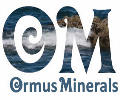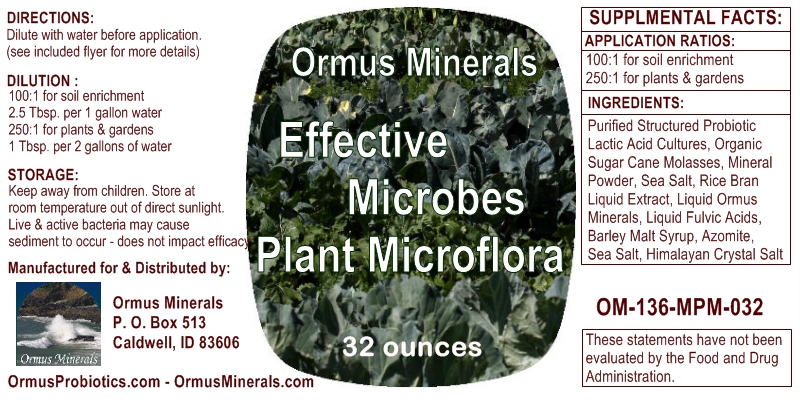Ormus Minerals Effective Microbes Plant Microflora Application
directions
Effective Microbes Plant Microflora
Effective Microbes Plant Microflora is 1:250 and 1:500
The application rate to apply this is
100 to 1 for Lawns 2.5 Tbsp to 1 gallon of water.
250 to 1 for Shrubs 1 Tbsp to 2 gallon of water
|

|
Internal
Liquid
Ormus Minerals Effective Microbes Plant
Microflora
|
|
Natural
Energy
Supplement
|
INGREDIENTS:
Ormus EM Probiotics grown on a medium of Organic Black Strap
Molassas, Liquid Ormus Minerals, Liquid Fulvic Acits, Barley Malt Syrup, Azomite, Sea Salt,
Himalayan Crystal Salt
|
|
|
SKU
NUMBER
|
PRICE
|
INFO
|
BUY NOW
|
|
|
OM-136-MPM-032
32 ounces
|
$40.00
|
View
Details
|

|
|
|
OM-136-MPM-064
64 ounces
|
$65.00
|
View
Details |
 |
|
|
OM-136-MPM-128
128 ounces
|
$100.00
|
View
Details |
 |
|

|
EM SAM technology for growing plants.
Species: Bacillus subtilis, Bifidobacterium animalis,Bifidobacterium
bifidum,Bifidobacterium longum,Enterococcus lactis,Enterococcus
thermophilus,Lactobacillus acidophilus,Lactobacillus bulgaricus,Lactobacillus
casei,Lactobacillus delbrueckii,Lactobacillus fermentum,Lactobacillus
plantarum,and Saccharomyces cerevisiae,
The application rate to apply this is
100 to 1 for Lawns 2.5 Tbsp to 1 gallon of water.
250 to 1 for Shrubs 1 Tbsp to 2 gallon of water
Plant Ormus Products
Ormus Minerals EM Plant Microflora
Natural INGREDIENTS:
Supplement
Please read below to fully understand the dilution ratios.
EM has excellent results with:
Higher yields
Improved soil structure, leading to better aeration and water holding capacity
Improved nutrient availability, leading to lower fertilizer requirements and higher fertilizer utilization
of applied inputs
Lower disease pressure by developing a disease suppressive soil
Lower requirements for pesticides
Improved quality of produce and greater storage ability
Improved animal performance by creating healthy living environments and improved digestion.
Restoring waterways and enhancing riparian areas
Basically, I determined that it would be a good idea to experiment with using
lesser amounts of EM (the lower end of the scale below), particularly if you are
having trouble diluting it with sufficient water. As shown below, I would like
to see at least a 1:250 dilution for foliar sprays and a 1:100 for turf and
soil, and I believe that 85 ml (1/3 cup) of EM per thousand square feet would be
a good place to start:
Dilution Rations for different uses.
1:10000 - for daily use, such as through an irrigation system
1:1000 - for weekly foliar use; 20-125 ml of EM per 1000 sq ft
1:100-1:250 - for monthly use as a foliar feed; higher dilution (1:250) is
better if possible; 85-500 ml of EM per 1000 sq ft
1:50 - for monthly/seasonal use on turf and as a soil drench; higher dilution
(1:100) is better if possible;
85-500 ml of EM per 1000 sq ft
1:1000 - for soaking seeds; 5-10 minutes only, as some seed may ferment after too long
Lawn and Garden - I think that perhaps the dilution ratio is more important than
the actual rate of application.
Lawn and Garden:
Trees and flowering plants 1:1000 or 2 Tbsp. per gallon of water
Spray soil and foliage with dilution for every season. DO NOT spray blooms or
they may drop.
Prepare soil and let sit for one month before seeding. Add EM weekly while
watering Apply to soil when preparing for fall season.
Storage:
Store Ormus EM Lawn Biotics out of direct sunlight at room
temperatures.
Notes for Lawn Applications.
In Vinny Pinto's book on agricultural EM use, he suggests ratios of anywhere
from 1:100 to 1:1000, but he says not to apply to tender leaves below 1:300. He generally suggests 85 ml per 1000
sq ft, at least 3 times a year and preferable more like once a month for the first couple of years.
Conclusions
The many researchers use widely varying application rates and dilutions
in
agriculture with much success. I believe we should begin experimenting with
using less EM and higher dilutions (more water). It seems to me that 1/3 cup (85 ml) per thousand square feet would
be a good place to start. This would make it easier to have higher dilutions.
I think that 1:100 should perhaps be a minimum for foliar and crop applications. If you can't use that much water,
try using less EM until you have that 1:100 ratio. If you can use more water, do so.
Remember how 1:500 outperformed 1:100 in the one trial and how 10 ml per 1000 sq ft was better than higher amounts
in the other?
Another trend is that regular applications are important, particularly in the
first couple of years.
This is not new information, but important to remember.
In the research, the EM is often applied with an equal amount of blackstrap
molasses to give the microbes some nutrients and carbohydrates, and to help the EM stick to the leaf
surface.
Also, it is apparent that it is important to also increase the organic matter
content of the soil while using EM. If the OM content is low, EM can cause some problems over time. Keep the leaves
and grass clippings in the yard.
So, in summary:
Let's try some lower application rates, perhaps starting with 1/3
cup EM
per 1000 sq ft * it should be diluted at least 1:100 * it should be done
regularly, perhaps once a month or more * it is a good idea to apply it with
an equal amount of blackstrap molasses, as well as bio-stimulants like sea
minerals, liquid kelp, and liquid fish * we also need to increase the
organic matter content of the soil
Implementing EM into Gardens and Farms
Seed Treatment: Soak seeds one day before planting in a 1:10000 EM / water
solution. If the seed cannot be soaked, moisten the seed before planting with
the same 1:10000 EM / water solution.
Transplanting: Water-in new transplants with a 1:750 EM /water solution. EM can be added with other products, such
as organic fertilizers, mineral supplements and compost teas during this process.
Foliar Treatments: Apply EM with a sprayer at a 1:500 EM / water dilution rate.
Application frequency should be every 2-6 weeks depending on conditions and objectives. Approximately 10 Litres /
hectare of EM should be applied during a foliar treatment.
If total spray rate is less than 1000 Litres / hectare and
more EM is needed for desired results a lower dilution rate, 1:250, may be
necessary. Treat a smaller test plot with the lower dilution rate and monitor
the crop response for 24-48 hours before treating the entire crop.
Soil Treatment: Add EM to irrigation water at a rate of 50 Litres of EM per
hectare. This can be done 4-8 times a year depending on climate. Dry or cold
climates require more frequent treatments. If you do not irrigate, EM can be
drilled into soil at a 8-15cm depth and a rate of 50 litres per hectare.
Cover Cropping: Apply EM as a foliar treatment at a 1:100 EM / water dilution
rate just before or after the cover crop is incorporated back into the soil.
Produced through a natural fermentation process, SCD Probiotics Soil Enrichment serves as a cost-effective
alternative to chemical additives. Enhanced levels of phototrophic non-sulfur bacteria (PNSB) have powerful
detoxifying anti-oxidant properties that help enrich the soil and improve plant performance.
You can use Probiotics Soil Enrichment to:
Improve the nutritional uptake efficiency of plants Increase seed germination
Enrich the soil in residential lawns and gardens Nurture healthy trees and
flowers Usage Guide: Probiotics Soil Enrichment is a concentrated formula and should be diluted with
water.
Dilute 1-2 tablespoons Soil Enrichment per gallon of water and apply directly to the soil around the base of the
plant.
Use weekly throughout the growing season.
When using as a seed soak, dilute 1 tablespoon of Probiotics Soil Enrichment per ½ gallon of water and soak for 24
hours.
Note: Store at room temperature and away from direct sunlight. The live and
active bacteria may cause sediment to occur. This is natural and does not impact the efficacy of the product.
|